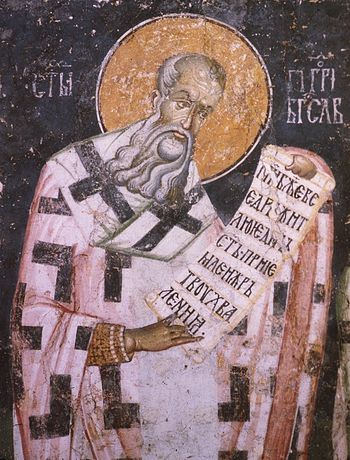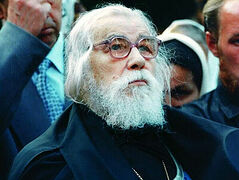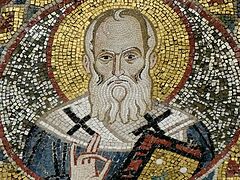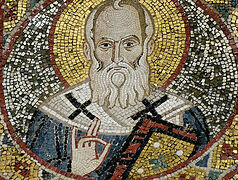 St. Gregory (329–391), fiery defender of Orthodoxy, profound thinker, and subtle theologian, is called Gregory the Theologian by the Universal Church. He became widely famous for his forty-five homilies, fragments of certain of which were even sung as church hymns. However, St. Gregory the Theologian was also a great ecclesiastical poet.
St. Gregory (329–391), fiery defender of Orthodoxy, profound thinker, and subtle theologian, is called Gregory the Theologian by the Universal Church. He became widely famous for his forty-five homilies, fragments of certain of which were even sung as church hymns. However, St. Gregory the Theologian was also a great ecclesiastical poet.
The saint wrote the larger part of his poetical compositions during the last years of his earthly life—after his return from Constantinople. The verses are not only dedicated to theological themes and moral teachings. A special category of the saint’s poetical heritage is his autobiographical works: memoirs, and poems written at the deaths of friends. The more well-known of these is a long poem in 1949 iambic verses, called, “Pro Vita Sua”.
The saint explains his motive behind using this literary form in the work, “On my Poems”. First of all, the poetic form “educates” the author, accustoming him to caring about measure, to expressing himself succinctly. Secondly, the saint wanted to give examples of soul-profiting poetry to those who love literary art, especially the young, and to take away the palm of primacy in literature from the ancient authors, “the incautious reading of which has at times brought forth bad fruits”. And thirdly, it is a war on heretics, mainly the Apollinarians, who composed new psalters and verses. “We shall also sing psalms, write much, and compose verse.”
St. Gregory’s verse is written in the traditions of ancient metrics: hexameters, pentameters, and trimeters. Nevertheless, the “Evening Hymn” we offer our readers is an exception. His poem [in the original] is seven-syllabic, syllabic-tonal, and closer to modern verse.
According to the testimony of St. John Chrysostom, this hymn was sung at evening services. It was basically yet another step towards the creation of Byzantine liturgical poetry.
In the hymn, St. Gregory’s favorite themes are developed, including the unity of the Holy Trinity, the creation of the world, the creation of man as an “image of light”, his enlightenment and theosis, universal harmony, and man’s ascetical life.
The translation, maximally approximating the original in length and meaning, was made from the ancient Greek language in the publication, Patrologia Graeca. v. 36. Col. 511–514.
This poem was translated into Russian by author and scholar Deacon Vladimir Vasilik. We are translating this Russian version into English, knowing of course that such a translation cannot match one from the original ancient Greek.—OC.
Evening Hymn
We bless Thee,
My Christ, Word of God
From Beginningless Light
Thou art Light, Keeper of the Spirit,
The Triune Light in one
Thou doest establish in glory.
And the movement of matter
Thou hast placed in order
And comeliness now.
And human mind
By wisdom and word
Thou hast enlightened, having placed,
Like brightness an icon
In the heights as in the deep.
Yeah, He sees the Light in light
And it becometh light completely.
Thou hast adorned with lamps
The great vaults of heaven
And commanded that, peacefully,
The darkness of night would
Alternate with day, so that the law of
Love and brotherhood be observed.
Thou dost complete at night
The labors of our much-toiling flesh,
And set us to do by day,
What is pleasing to Thee.
That escaping the darkness,
We might reach the day,
That before day we be not subject
To terrible, ominous darkness.
And give Thou sleep most light
To my weary eyes,
That my tongue, singing praises,
Joining chorus with the heavenly powers
May not long fall motionless,
May not Thy servant fall silent
Amidst good thoughts
In his departure to sleep.
Let night not reproach
The defiled thought of the day,
And let the mocking laughter of night
Not hinder lamentation.
But may the mind outside the body
Glorify Thee, O God.
Father, Son, and Holy Spirit,
To Them together be praise,
Honor and glory,
Unto the ages of ages.



